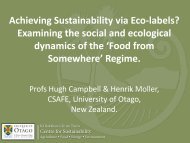Book of Abstract (incl. addendum) - IFSA symposium 2012
Book of Abstract (incl. addendum) - IFSA symposium 2012
Book of Abstract (incl. addendum) - IFSA symposium 2012
You also want an ePaper? Increase the reach of your titles
YUMPU automatically turns print PDFs into web optimized ePapers that Google loves.
Workshop 1.1 Knowledge flows in pluralistic research and advisory systems: how do advisors<br />
keep up-to-date and to what extent is their advice evidence-based?<br />
which make it possible to assess the different types and levels <strong>of</strong> evidence that support the content <strong>of</strong><br />
the advice.<br />
The analysis is based on field investigations in France (Ain), Germany (Brandenburg) and the<br />
Netherlands (Zeeland). It consisted in qualitative interviews (n=16 firms) with the managers <strong>of</strong> three<br />
types <strong>of</strong> service suppliers to farmers specialized in arable farming: private consultancy cabinets, input<br />
suppliers, and s<strong>of</strong>tware suppliers.<br />
We could identify three logics <strong>of</strong> performance: "a service" logic associated with private<br />
consultancy cabinets, an "industrial" logic characterizing s<strong>of</strong>tware suppliers, and a logic <strong>of</strong><br />
segmentation implemented by input suppliers. A more specific inquiry related to knowledge about food<br />
safety showed the consequences <strong>of</strong> these logics beyond individual concerns <strong>of</strong> farmers. It demonstrates<br />
that the withdrawal <strong>of</strong> the state from the funding and management <strong>of</strong> extension may lower the level <strong>of</strong><br />
evidence produced for the farmers, by substituting expertise to controlled trials and observations, and<br />
by giving a more and more important role to private investments related to upstream industries.<br />
Reflections on the ‘expert syndrome’: a Greek case study on extension<br />
education<br />
Nikos Kaberis and Alex Koutsouris<br />
Athens Academy, Greece<br />
Kaberis@academy<strong>of</strong>athens.gr<br />
Changes pertaining the agricultural knowledge infrastructure, innovation theory and practice as well as<br />
the knowledge demand and supply side point to the current, challenging scene for agricultural/rural<br />
extension and education. Therefore, new concepts/approaches emerge building on networks, as social<br />
processes encouraging the sharing <strong>of</strong> knowledge and notably as preconditions for innovation;<br />
moreover, growing attention is given to various types <strong>of</strong> intermediaries or (process) facilitators.<br />
On the other hand, knowledge, skills and aptitudes explain the differential production outcomes<br />
between business people occupying identical resources (capital, labour and land). Farm businesses with<br />
better educated farm managers attain superior outcomes; education and training have been shown to<br />
improve farmers’ ability to make successful changes to farming practices, <strong>incl</strong>uding farm-management<br />
practices, and assist farmers to become more innovative and flexible.<br />
The current paper explores the issue <strong>of</strong> extension education through research carried out in a<br />
Greek rural area. The target-group comprises participants in the ‘Young Farmers Programme’, a<br />
programme established by the European Union and the Greek state since the early ‘90s, providing<br />
economic incentives to young men and women (up to 40 years old) who enter or are newly established<br />
in farming. A requirement <strong>of</strong> the programme is the training <strong>of</strong> Young Farmers for at least 150 hours<br />
within three years after their access to the programme. These short-term training schemes, provided by<br />
the Greek Extension Service, are the entry point <strong>of</strong> this paper.<br />
Young Farmers’ (YFs) attitudes towards and relationships with agronomists, with the latter<br />
beeing involved in either training or advice provision, are thus explored. To refine such an exploration<br />
different groups <strong>of</strong> YFs (those at plain areas vs. those at mountainous ones and thus <strong>of</strong> the respactive<br />
production systems) and agronomists (public vs commercial advisors) are distinguished.<br />
12











